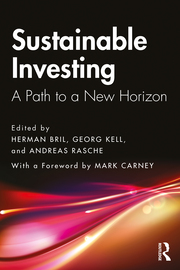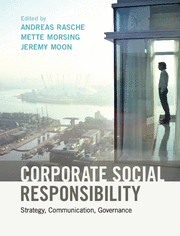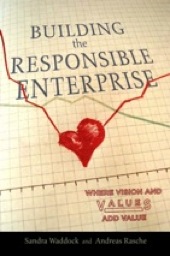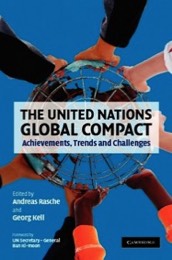Andreas Rasche
Copenhagen Business School

Sustainable Investing: A Path To a New Horizon (edited with Georg Kell and Herman Bril)
This book tells the story of how the convergence between corporate sustainability and sustainable investing is now becoming a major force driving systemic market changes. The idea and practice of corporate sustainability is no longer a niche movement. Investors are increasingly paying attention to sustainability factors in their analysis and decision-making, thus reinforcing market transformation.
In this book, high-level practitioners and academic thought leaders, including contributions from John Ruggie, Fiona Reynolds, Johan Rockström, and Paul Polman, explain the forces behind these developments. The contributors highlight (a) that systemic market change is influenced by various contextual factors that impact how sustainable investing is perceived and practiced; (b) that the integration of ESG factors in investment decisions is impacting markets on a large scale and hence changes practices of major market players (e.g. pension funds); and (c) that technology and the increasing datafication of sustainability act as further accelerators of such change.
The book goes beyond standard economic theory approaches to sustainable investing and emphasizes that capitalism founded on more real-world (complex) economics and cooperation can strengthen ESG integration. Aimed at both investment professionals and academics, this book gives the reader access to more practitioner-relevant information and it also discusses implementation issues. The reader will gain insights into how "mainstream" financial actors relate to sustainable investing.
>>> Published by Routledge >>> Book's Website at Routledge
In this book, high-level practitioners and academic thought leaders, including contributions from John Ruggie, Fiona Reynolds, Johan Rockström, and Paul Polman, explain the forces behind these developments. The contributors highlight (a) that systemic market change is influenced by various contextual factors that impact how sustainable investing is perceived and practiced; (b) that the integration of ESG factors in investment decisions is impacting markets on a large scale and hence changes practices of major market players (e.g. pension funds); and (c) that technology and the increasing datafication of sustainability act as further accelerators of such change.
The book goes beyond standard economic theory approaches to sustainable investing and emphasizes that capitalism founded on more real-world (complex) economics and cooperation can strengthen ESG integration. Aimed at both investment professionals and academics, this book gives the reader access to more practitioner-relevant information and it also discusses implementation issues. The reader will gain insights into how "mainstream" financial actors relate to sustainable investing.
>>> Published by Routledge >>> Book's Website at Routledge
This book argues convincingly that sustainable investing is becoming mainstream, as increasing numbers of asset owners, investment managers and companies take steps toward addressing longer-term challenges facing businesses and society. The question is not whether these commitments are welcome – they are – but whether they will be anywhere near enough to address our climate crisis and accomplish the Just Transition so necessary in the decade ahead.
Al Gore and David Blood (Generation Investment Management)
This is an engaging book encompassing a wealth of knowledge for anyone interested in sustainable investing: from the experienced investor who wants to better understand the field of sustainable investing to the intellectually curious business leader who wants to learn more about what it is and how it can be practiced.
George Serafeim (Harvard Business School)

Corporate Social Responsbility: Strategy, Communication, Governance (edited with Mette Morsing and Jeremy Moon)
This upper-level textbook offers an original and up-to-date introduction to issues in corporate social responsibility (CSR) from a global perspective. Written by an international team of experts, it guides students through key themes in CSR including strategy, communication, regulation and governance. Balancing critiques of CSR with a discussion of the opportunities it creates, it includes chapters devoted to critical issues such as human rights, anti-corruption, labour rights and the environment. Pedagogical features include customised case studies, study questions, key term highlighting, practitioner pieces and suggestions for further resources. The book is also complemented by a companion website featuring adaptable lecture slides, teaching notes for cases and links to related resources. Tailored for upper-level undergraduate and postgraduate courses on corporate social responsibility, sustainability and business ethics, it is also relevant to non-business courses in political science, international relations and communications..
>>> Published by Cambridge University Press >>> Chapter 1 (free download) >>> Book's Website at Cambridge University Press (incl. Lectures Slides, Videos, and Teaching Notes)
>>> Published by Cambridge University Press >>> Chapter 1 (free download) >>> Book's Website at Cambridge University Press (incl. Lectures Slides, Videos, and Teaching Notes)
Finally, a text with the courage to stand up and tell CSR’s whole wonderful, conflicted story. As savvy about corporate practice as it is about academic theory, this text will set the bar for all that follow.
Tom Donaldson (The Wharton School, University of Pennsylvania)
CSR in its best form! This is a pedagogically valuable, comprehensive, critical, and thought provoking textbook on CSR written by the leading experts in the field. It will be a compulsory reading for any student and academic interested in the changing responsibilities of business in a globalized world.
Andreas Georg Scherer (University of Zurich)

Building the Responsible Enterprise (with Sandra Waddock)
Building the Responsible Enterprise provides students and practitioners with a practical, yet academically rooted, introduction to the state-of-the-art in sustainability and corporate social responsibility.The book consists of four parts, highlighting different aspects of corporate responsibility. Part I discusses the context in which corporate responsibility occurs. Part II looks at three critical issues: the development of vision at the individual and organizational levels, the integration of values into the responsible enterprise, and the ways that these building blocks create added value for a firm. Part III highlights the actual management practices that enable enterprises to achieve excellence, focusing on the roles that stakeholder relationships play in improving performance. The book concludes with a conversation about responsible management in the global village, examining the emerging infrastructure in which enterprise finds itself today. Throughout the text, cases exemplify key concepts and highlight companies that are guiding us into tomorrow's business environment.
>>> Published by Stanford University Press >>> Read First Chapter >>> Read Book Review in Organization Studies
>>> Published by Stanford University Press >>> Read First Chapter >>> Read Book Review in Organization Studies
This book is extremely readable without sacrificing attention to relevant studies. It does a wonderful job of translating research for those who do not spend their professional lives immersed in this topic.
Ann Buchholtz (Rutgers University)
It is a very timely and comprehensible read, even given its attention to academic literature. The authors present research findings in a readable fashion, lacing the details of studies with current examples to make the mundane come to life . . . Recommended.
Choice Magazine

The United Nations Global Compact (edited with Georg Kell)
This book is about a public-private partnership initiative of the United Nations: The United Nations Global Compact. The book reviews the first ten years of the Compact’s existence (2000-2010) by pulling together exclusively commissioned chapters from well-known scholars, practitioners, and Global Compact staff. All authors reflect on what the Global Compact has achieved, what trends it may have to respond to, and what challenges still lie ahead when considering the political environment that the initiative navigates in. For the first time, practitioners from the business world and civil society, well-known academics who have researched the Global Compact, and Global Compact staff join forces to systematically discuss the initiative. The books contains chapter contributions by Huguette Labelle, Oded Grajew, Paul Hohnen, Guido Palazzo and Andreas Scherer, Carolyn Woo, Malcolm McIntosh and Sandra Waddock, Dirk Ulrich Gilbert, Pat Werhane and Regina Wolfe, Guy Ryder, Greg Unruh and others.
>>> Published by Cambridge University Press >>> Read Book Review in the Cambridge Review for International Affairs >>> Read Book Review in Business & Society
>>> Published by Cambridge University Press >>> Read Book Review in the Cambridge Review for International Affairs >>> Read Book Review in Business & Society
This book offers a comprehensive analysis of the initiative’s governance, its engagement mechanisms and, most importantly, its impact. I commend it to a wide global audience, and to all who want to learn more about the Compact’s journey and its proven capacity to generate positive change for people and the planet.
H. E. Ban Ki-moon (UN Secretary-General)
This timely book reviews the UN Global Compact's strengths and shortcomings over its first decade and provides helpful guidance for all committed to mainstreaming responsible business practices and achieving real change through multistakeholder intiatives.
Mary Robinson (former President of Ireland and
UN High Commissioner for Human Rights)

The Paradoxical Foundation of Strategic Management
This book is all about questioning 'conventional' assumptions in strategy research. I argue that strategy scholars are very skilled in obscuring paradoxes and, by doing so, sustain their traditional assumptions. The text deconstructs the theory of strategic management by using the philosophy of Jacques Derrida. Only a deconstruction of strategic management uncovers the many paradoxes that are at the heart of theorizing about 'strategy'. Despite conventional wisdom, I claim that paradoxes are very helpful in getting to know the limits of knowledge about strategic management. Thus, I explain how paradoxes can stimulate future theorizing about strategic management and why we should value them more than we currently do.
>>> Published by Springer >>> Read Book Review in Organization Studies
>>> Published by Springer >>> Read Book Review in Organization Studies
This book is a novel, refreshing and important contribution to the generally unreflective and programmatic approach widespread in strategy research.
Robert Chia (University of Glasgow)
Andreas Rasche is right: We have to think of strategy as being always already in deconstruction.
Gunther Ortmann (Helmut Schmidt University Hamburg)